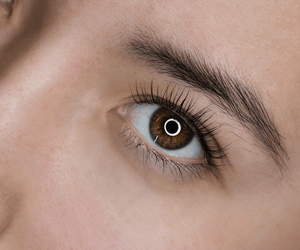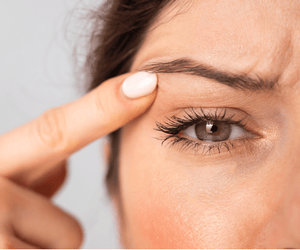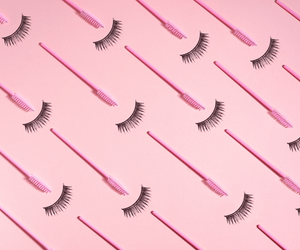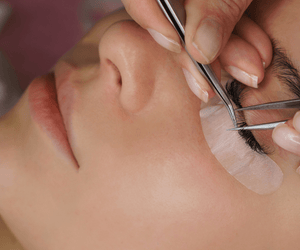Are your eyelashes turning white? It makes sense to be concerned, especially if you don’t have many white hairs elsewhere. Normally, lashes turn white as part of the aging process, with genetics also playing a big part.
When it happens suddenly, there might be other underlying causes, and you do want to pay attention. While it’s normally harmless, having your eyelashes turn white can signal certain health conditions or deficiencies.
In this guide, we’ll cover all of the potential reasons why lashes might lose their pigment, and give some recommendations for what you should do.
Table of Contents
What Causes Eyelashes to Turn White?
Aging
This is the most common reason why lashes can turn white. As we get older, melanocytes (i.e., the cells responsible for producing pigment in the hair follicles) can die off, which causes hair on the head and body to turn white.
A 2014 study actually investigated the ages at which lash and brow hairs begin to turn white. The study found that it’s quite rare before the age of 41, and that it becomes a little more common around the mid-60s. However, the study also mentions that it’s rare for people to have more than 1-3 white lashes as a result of aging.
Genetics
Some people experience premature whitening due to inherited traits. Technically, this is still the same type of hair or lash whitening that comes with age for most other people, but it just happens to hit you younger for no discernible reason. While it’s worth double-checking with a doctor, unexplained white lashes can just be an anomaly that makes you unique.
Medical conditions
Poliosis is the medical term for when a patch of hair turns white, and it can be a symptom of a few different medical conditions.
The most common reason why lashes turn white is vitiligo, an autoimmune condition that leads to localized loss of pigmentation in the skin. When vitiligo impacts the area around the eyes, it can also affect the lashes in whole or in part.
While quite rare, lashes may also turn white as a reaction to eyelid inflammation (i.e., blepharitis). Blepharitis can be caused by several different factors, including eye infections, mites, or sebaceous gland malfunction.
Alopecia is a condition that causes hair and lash loss. When hair and lashes grow back, they can be finer or lighter. Thyroid disorders, especially hypothyroidism, may also lead to premature graying by causing nutritional deficiencies.
Finally, there is a serious but rare autoimmune condition called Vogt-Koyanagi-Harada syndrome. It causes flu-like symptoms, vision changes, and depigmentation of skin and hair. If you think you might be dealing with this condition, it’s important to seek medical care.
Nutritional deficiencies
There are a handful of nutritional deficiencies that can lead to general premature graying, which can also impact your lashes. They include deficiencies in B12, iron, copper, zinc, vitamin D3, and protein. Having a nutritionally diverse diet is important, but it’s not always enough. In some cases, deficiencies are caused by the body’s inability to process certain nutrients.
Medication and treatments
Developing patches of white lashes can be a side effect of several medications or treatments — especially ones that have an immunosuppressive effect. It can occur as hair regrows after cancer treatment, for example.
Stress and lifestyle
Chronic stress can also accelerate melanocyte loss in the hair follicles. While the exact reason why isn’t clear yet, it’s very possible that experiencing significant or chronic stress could cause lashes and hair to turn white.
Lastly, smoking causes a lot of oxidative damage, so it is also a major culprit in premature graying.
Is It Normal to Have White Eyelashes?
If you’re in your 40s and above, having a few white eyelashes is perfectly normal. Even if you’re younger, while white lashes may not be typical, they’re not a cause for concern.
It’s still a good idea to mention them to your medical provider, particularly if you’re also experiencing other symptoms such as loss of skin pigment, skin inflammation, hair loss, flu-like symptoms, or vision changes. If that’s the case, speak to your doctor.
You should also consider whether white lashes are a sign you need to make some lifestyle changes, particularly if you experience a lot of stress, have gaps in your diet, or smoke.
Can White Eyelashes Turn Back to Their Natural Color?
Once melanocytes in a certain hair follicle die off, there is usually no way to bring them back. This means that if your lashes have started turning white, it’s unlikely they’ll return to their previous color.
However, if your lashes turned white temporarily after lash loss or as a result of a nutritional deficiency, they may return to their original color.
Thankfully, there are a lot of ways to darken your lashes with the help of cosmetics. Mascara is a classic choice, as it’ll help darken your lashes instantly, and can also add length and volume.
Many people turn to eyelash tinting, which involves applying a semi-permanent dye to the lashes. You’ll want to be careful and avoid getting the tint in your eyes, but this can be an effective solution for up to a few weeks.
Lash clusters are another great option. Unlike lash extensions or false lashes, they fit in below the lash line, so they can help cover your white lashes. Lilac St.’s lash clusters stay put for a few days at a time, so they save you the hassle of reapplying makeup.
How to Take Care of White Eyelashes?
Without pigment, white lashes may be a little coarser and more brittle than your dark eyelashes, so you will want to prioritize gentle care.
Keep your lashes clean and nourished — you can use a dedicated eyelash cleanser and serum, or simply use eye-safe skincare products. If you wear mascara, make sure to remove it with a dedicated makeup remover, as improper removal can often lead to lash breakage.
Avoid excess friction against the eyes, so stay away from rubbing and don’t sleep with your face against the pillow. Wearing a domed sleep mask can also help protect the lashes.
Conclusion
Whether it’s due to age or other reasons, having your eyelashes turn white can be a surprise. In most cases, it’s just a sign of the times or a genetic anomaly you don’t need to worry about. However, in some cases, having your lashes turn white may be a symptom of a deficiency or health problem, in which case we recommend seeking medical care.








